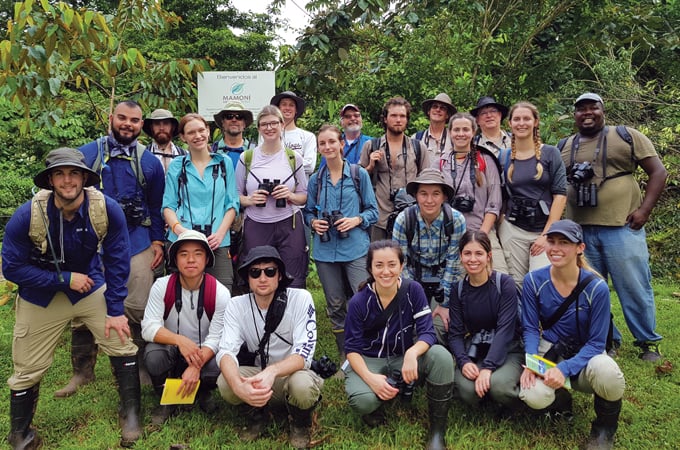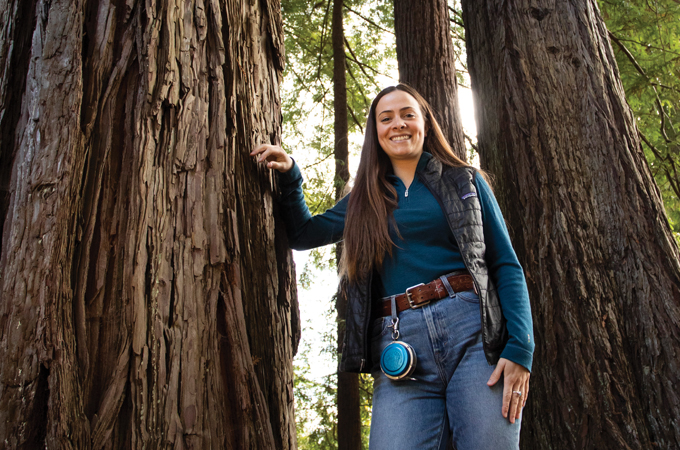Abigail (Abby) Bohman ’18, ’19 (MS GIS) has had a passion for the world since the tender age of five, an attitude she attributes to her parents and grandparents. Her grandfather was in the Air Force in World War II, and her parents are longtime employees of the National Park Service. “It has always made sense to me to travel and try new things,” she says. “The learning experience is so much bigger when I’m in a new place.”
Mindful of this love for other lands, the Port Angeles, Washington, native weighed opportunities for study abroad when selecting her undergraduate institution, which led her to Redlands: “The multitude of international options offered at the University made it very appealing.”
Once a Redlands undergraduate, Bohman became an environmental science major and took full advantage of opportunities at the University. Enrolling in three international May Term classes, she studied whales in Ecuador and the Galapagos with Biology Professor Lei Lani Stelle, took a geology class in Iceland with Environmental Studies Professor Hillary Jenkins, and learned about tropical forest ecology and restoration in Panama with Environmental Studies Professor Daniel Klooster.
“May Term is a great program, really one of the best things the University has to offer,” she enthuses. “The experiences allowed me to do activities in places I never would have experienced otherwise. This deepened my appreciation for the planet and its diversity of people, cultures, and the environment, which is something that affects my attitude every day.”
Professor Susan Goldstein, whose research spans study abroad and intercultural experiences, notes that the length of study abroad is less important than its fit for the individual student. “Research shows that, despite popular opinion, total immersion doesn’t necessarily equal success,” she says, noting that students’ needs and affinity for adventure varies. “What’s most important is a personalized experience.”

For Bohman—who also spent a semester in Tanzania learning about wildlife management—her chosen experiences abroad transformed the way she approached her academics. “Before going overseas, I was more concerned with maintaining a high grade-point average than really learning,” she confesses, “but after studying abroad, my focus changed. I wanted to understand the subjects I was studying, and I started to enjoy the content of my courses much more.”
Bohman’s travels also impacted the kinds of classes that captured her imagination back at Redlands, and she began seeking out courses with a cultural angle—for example, Professor Patrick Wing’s History of the Islamic Middle East and Professor John Glover’s Mapping African History. She also started seeing connections across disciplines, such as linking what she was learning in a physical geography class to studies in Islamic history.
After graduating with her bachelor’s degree, Bohman enrolled in the U of R master’s in geographic information systems (GIS) program. “I wanted to pursue a degree in GIS because it is a very diverse field where I can merge and compare many aspects of the world,” she says, adding that she had heard good things about the Redlands program. “It’s also a growing and powerful field, which I find exciting.”
In her studies, she was able to leverage her previous contact with a client in Panama and returned there to conduct research. Her master’s project focused on a new method using drones to monitor tropical deforestation, since cloud cover posed a problem for satellite imagery.
Bohman finished the GIS program in August and is now employed as a consulting utility forester with Environmental Resources Management; she’s tasked with mapping out PG&E electrical lines that could be potential fire starters in Central and Northern California and using many of the GIS skills she honed abroad.
But she has not lost her love for foreign lands. “I’m compiling a list of organizations that do environmental and humanitarian work in Africa and familiarizing myself with their operations,” she says. “My main goal is to keep learning from many places and cultures of the world.”






